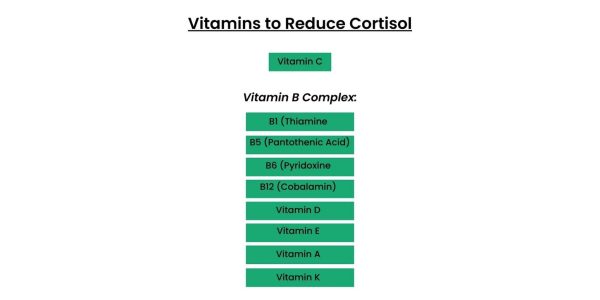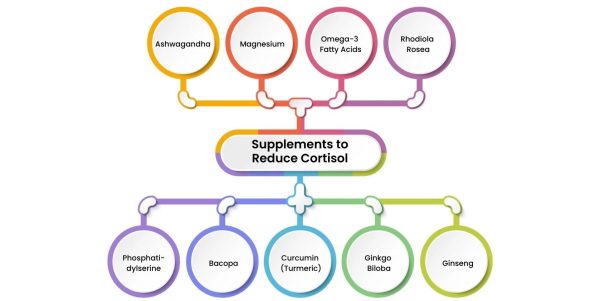Cortisol plays a crucial role in our daily rhythms, influencing everything from our energy levels to our immune response. When stress becomes chronic, however, cortisol levels can remain consistently high, potentially leading to various health issues.
Both men and women can experience elevated cortisol levels, though studies suggest that women may be more susceptible due to hormonal fluctuations. Fortunately, there are natural ways to manage cortisol levels, including the use of cortisol reducing supplements.
These supplements are gaining attention for their potential to support stress management and overall well-being. Let’s explore which supplements may help lower cortisol levels effectively.
What is Cortisol – Why Should You Reduce It?
Understanding cortisol and why it’s important to manage its levels is crucial for maintaining overall health and well-being. Cortisol, often dubbed the “stress hormone,” is produced by the adrenal glands in response to stress signals from the brain. While cortisol serves essential functions such as regulating metabolism, immune response, and blood pressure, prolonged elevation can lead to negative health outcomes.
Chronic stress, whether from work pressures, lifestyle factors, or emotional turmoil, can keep cortisol levels elevated, contributing to issues like weight gain, sleep disturbances, impaired cognitive function, and even cardiovascular problems over time.
Therefore, finding ways to reduce cortisol levels naturally, such as through lifestyle changes and cortisol reducing supplements, can significantly benefit long-term health and quality of life.
How Cortisol Works in Your Body?
Cortisol plays a vital role in the body’s stress response system, orchestrating a cascade of physiological changes to help us cope with challenges. When faced with stress, whether physical, emotional, or environmental, the brain signals the adrenal glands to release cortisol into the bloodstream.
This hormone then mobilizes energy stores, enhances the brain’s use of glucose, and modulates inflammation to prepare the body for action. However, prolonged or excessive cortisol secretion can lead to detrimental effects on health.
Symptoms of elevated cortisol levels include:
- Increased abdominal fat deposition
- Insomnia or disrupted sleep patterns
- Impaired cognitive function and memory
- High blood pressure
- Reduced immune function
- Mood swings and anxiety
Supplements to Reduce Cortisol
To lower cortisol levels naturally, certain supplements have gained attention for their potential benefits in stress management and overall well-being. Here are some supplements known for their cortisol-reducing properties:
 Ashwagandha
Ashwagandha
Ashwagandha, scientifically known as Withania somnifera, is an adaptogenic herb traditionally used in Ayurvedic medicine. Research suggests that Ashwagandha can help lower cortisol levels by reducing stress and anxiety, promoting relaxation, and supporting adrenal function.
Its ability to modulate the body’s stress response makes it a popular choice for those looking to manage cortisol levels naturally.
Magnesium
Magnesium plays a vital role in over 300 biochemical reactions in the body, including the regulation of cortisol secretion. Studies have shown that magnesium deficiency can lead to elevated cortisol levels and increased stress responses.
Supplementing with magnesium can help support relaxation, muscle function, and overall stress management, thereby potentially reducing cortisol levels over time.
Omega-3 Fatty Acids
Omega-3 fatty acids, found in fatty fish like salmon and in supplement form, are well-known for their anti-inflammatory properties. Chronic stress can lead to increased inflammation and elevated cortisol levels.
Omega-3s help counteract this by reducing inflammation and supporting cardiovascular and brain health, contributing to a healthier stress response and potentially lowering cortisol levels.
Rhodiola Rosea
Rhodiola rosea is an adaptogenic herb that has been used for centuries in traditional medicine to combat stress and fatigue. Studies indicate that Rhodiola rosea may help regulate cortisol levels by modulating the body’s stress response system.
Its ability to enhance resilience to stressors and improve overall well-being makes it a valuable supplement for those seeking to manage cortisol levels naturally.
Phosphatidylserine
Phosphatidylserine is a phospholipid found in high concentrations in cell membranes, particularly in brain cells. Research suggests that phosphatidylserine supplementation can help normalize cortisol levels during periods of stress.
By supporting cognitive function and adrenal health, phosphatidylserine contributes to a balanced stress response and may aid in cortisol management.
Bacopa
Bacopa monnieri, an herb traditionally used in Ayurvedic medicine, has adaptogenic properties that help the body adapt to stress. Studies have shown that Bacopa may reduce cortisol levels and improve mood and cognitive function, making it beneficial for stress management and overall mental health.
Curcumin (Turmeric)
Curcumin, the active compound in turmeric, possesses potent anti-inflammatory and antioxidant properties. Research suggests that curcumin supplementation may help reduce cortisol levels by combating inflammation and oxidative stress associated with chronic stress. Its neuroprotective effects also support cognitive function and mood stability, further contributing to stress management.
Ginkgo Biloba
Ginkgo biloba extract is derived from the leaves of the Ginkgo biloba tree and has been used in traditional Chinese medicine for centuries. Studies suggest that Ginkgo biloba may help regulate cortisol levels by improving blood flow, reducing inflammation, and enhancing cognitive function.
Its antioxidant properties also protect against oxidative stress caused by chronic stressors, thereby supporting adrenal health and stress resilience.
Ginseng
Ginseng, particularly Panax ginseng and American ginseng, is renowned for its adaptogenic properties and ability to enhance resilience to stress. Research indicates that ginseng supplementation may help lower cortisol levels and improve energy levels, cognitive function, and overall well-being.
By supporting adrenal function and promoting a balanced stress response, ginseng contributes to effective cortisol management and stress reduction.
Vitamins to Reduce Cortisol
When seeking natural ways to manage cortisol levels, certain vitamins play a crucial role in supporting overall stress management and adrenal health. Incorporating these vitamins into your diet can help promote cortisol balance and support your body’s resilience to stress.

Vitamin B Complex:
B1 (Thiamine): Supports energy metabolism and nervous system function, both of which can be impacted by chronic stress.
B5 (Pantothenic Acid): Supports adrenal gland function and the production of stress hormones, helping to regulate cortisol levels.
B6 (Pyridoxine): Involved in neurotransmitter synthesis, including serotonin and dopamine, which play roles in mood regulation and stress response.
B12 (Cobalamin): Essential for nerve function and the formation of red blood cells. It supports the nervous system, potentially reducing symptoms of stress and anxiety.
Vitamin D: Known as the “sunshine vitamin,” vitamin D plays a crucial role in mood regulation and immune function. Low levels of vitamin D have been linked to increased cortisol production, making adequate vitamin D levels important for maintaining balanced cortisol levels.
Vitamin E: Acts as an antioxidant, protecting cells from oxidative damage caused by stress and cortisol. It supports cardiovascular health and overall cellular integrity, contributing to a healthier stress response.
Vitamin A: Supports immune function and helps maintain healthy vision and skin integrity. Adequate levels of vitamin A can support overall health, which can be beneficial in managing stress and cortisol levels.
Vitamin K: Essential for blood clotting and bone health, vitamin K also supports cardiovascular health and may indirectly influence stress responses by promoting overall wellness.
Tips to Manage Cortisol Levels
Managing cortisol levels effectively is essential for maintaining overall health and well-being, especially in today’s fast-paced world. Here are some practical tips to help regulate cortisol levels naturally:
Healthy Diet: Eat a balanced diet rich in whole foods, fruits, vegetables, and lean proteins. Avoid excessive sugar and refined carbohydrates, which can lead to spikes in blood sugar and cortisol.
Regular Exercise: Engage in regular physical activity, such as walking, jogging, yoga, or swimming. Exercise helps reduce stress and promotes the release of endorphins, which can counteract cortisol’s effects.
Adequate Sleep: Prioritize quality sleep of 7-9 hours per night. Poor sleep can elevate cortisol levels and disrupt the body’s natural stress response.
Stress Management Techniques: Practice relaxation techniques like deep breathing, meditation, or mindfulness to reduce stress levels and lower cortisol production.
Limit Caffeine and Alcohol: Excessive consumption of caffeine and alcohol can stimulate cortisol release. Limit intake to moderate levels or consider alternatives like herbal teas.
Social Support: Maintain strong social connections with friends, family, or support groups. Positive social interactions can help buffer the effects of stress and lower cortisol levels.
Time Management: Organize your schedule and prioritize tasks to minimize stressors and avoid overwhelming situations.
Final Thoughts
Managing cortisol levels effectively is vital for overall health and well-being in our fast-paced lives. By understanding the role of cortisol as our body’s stress hormone, we can appreciate the importance of keeping it in balance. Implementing lifestyle changes such as maintaining a healthy diet, regular exercise, adequate sleep, and stress management techniques like mindfulness or relaxation exercises can all contribute to reducing cortisol levels naturally.
By prioritizing these habits, individuals can support their body’s ability to cope with stress more effectively, leading to improved mental and physical health over time. Understanding and actively managing cortisol levels empowers us to live healthier, more balanced lives.


 Ashwagandha
Ashwagandha